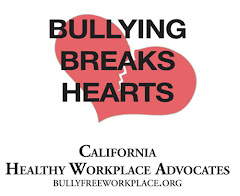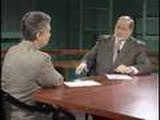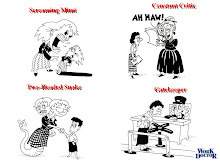Friday, July 30, 2010
Workplace bullying is rampant in American labor
Workplace bullying is rampant in American labor. If you haven't yet done so, check out the WBI-Zogby data at the Workplace Bullying Institute, http://www.bullyinginstitute.org/ 2.
For both public and private sector employers, bullies are too expensive to ignore and to keep. Too often, employers don't know what to do about them, as there is yet no law against work abuse. Bullies can damage, if not destroy, an organization. The State of Illinois is a prime example of this, as we are still very much on the mend from our recent horrifying and embarrassing bullying experience from the top.
Opponents argue that passage of this legislation will create lawsuits. Those lawsuits are already occurring. They are poorly filed as discrimination, intentional infliction of emotional distress, workers comp claims, etc. Severely damaged targets logically seek whatever avenue for justice they can find. This litigation is often weak and can last years, be quite expensive for both sides, and is often dismissed on slight technicalities. Settlements are usually accompanied by "hush clauses," even when the "fine for immoral behavior" is coming from public funds.
Our true mission is to "recognize and prevent" work abuse before it gets to litigation. Without the threat of litigation, about 10% of the perpetrators won't knock it off, behave themselves, and follow the Golden Rule like the rest of us usually do.
Keep in mind that the burden of proof is on the target. The standard of proof is quite high and subject to expert witnessing. The bill is easy to understand. It's written by Professor David Yamada, a Suffolk University labor law professor with a top national reputation.
Opposition is based on fear and is very shortsighted. It's like putting a blue tarp over a leaky roof instead of finding the leak and fixing the hole that causes it. Illinois needs to find that leak. The research that's already been done by the Drs. Ruth and Gary Namie of the WBI and a cadre of global experts is readily available.
Healthy Workplace Advocates will get this bill passed in at least one state very soon. Social evolution is slow, but certain. Illinois can be first, but it will not be the last. This movement will sweep our nation state by state. By being first, Illinois can bring moral capital back that we recently lost, much to our shame and embarrassment. Standing up to the bullies is deeply embedded in our State's history. I think Abe would be proud if we led the way out of this form of oppression. Don't you? For more information about what happened on the Citizen Lobby Day and how we can plan one for California, contact info@bullyfreeworkplace.org.
Thursday, July 29, 2010
Yahoo asked, "Should you be able to sue your boss for workplace bullying?"
It's time to compel employers to put policies and procedures in place to correct and prevent workplace bullying. In most cases, once reported, if the bully is told to "knock it off", they will reign themselves in. If the bully refuses to stop their behavior, they will become responsible for their actions, not the employer.
Without being compelled by law, employers have no legal recourse to stop the bully. Employers need this law as much as the employees do. Without a law to prevent it, the HR Dept. can easily become complicit in the bullying, with or without their intention to do so. It's time...time to do the right thing. We're never too old to apply the Golden Rule, "Do unto others as you would have them do unto you"...remember that one? I think we learned it in Kindergarten. It's time to apply what we learned in school to the workplace. After all, without intervention, where do we think schoolyard bullies go when they grow up?
Source(s):
www.workplacebullying.org
http://newworkplace.wordpress.com/2010/07/13/why-the-healthy-workplace-bill-is-hr-friendly/
Monday, July 26, 2010
Workplace Bullying in New York Times & YouTube
New York Times article:
http://www.time.com/time/nation/article/0,8599,2005358,00.html#ixzz0uQqnQbMQ
Interview:
http://www.youtube.com/watch?v=Wu2kWy14REg
David Yamada
Read my blog, Minding the Workplace, at:
http://newworkplace.wordpress.com
Think of workplace bullying as the underlying foundation of all the other behaviors we discourage at work...sexual harassment, verbal abuse, physical abuse, prejudice...it's all about one person or group exercising unreasonable power over another. We've created laws to deal with the symptoms...now it's time to address the core issue, workplace bullying.
It's time to compel employers to put policies and procedures in place to correct and prevent workplace bullying. In most cases, once reported, if the bully is told to "knock it off", they will reign themselves in. If the bully refuses to stop their behavior, they will become responsible for their actions, not the employer.
Without being compelled by law, employers have no legal recourse to stop the bully. Employers need this law as much as the employees do. Without a law to prevent it, the HR Dept. can easily become complicit in the bullying, with or without their intention to do so. It's time...time to do the right thing. We're never too old to apply the Golden Rule...do unto others as you would have them do unto you...remember that one? I think we learned it in Kindergarten...time to apply what we learned in school to the workplace. After all, without intervention, where do we think schoolyard bullies go when they grow up?
Source(s):
www.workplacebullying.org
http://newworkplace.wordpress.com/2010/07/13/why-the-healthy-workplace-bill-is-hr-friendly/
Saturday, July 10, 2010
Union Support for Healthy Workplace Bill in New York
Healthy Workplace/Bullying Law Passed By State Senate Continues To Garner Support From Organized Labor While Being Attacked By The Buffalo-Niagara Partnership as “Harmful To New York’s Private Sector”
(BUFFALO) – While the effort to have a Healthy Workplace/Workplace Bullying Law passed in New York is continuing to move forward – albeit slowly – the potential new state legislation is continuing to garner additional support from Organized Labor, but is also being attacked by the Buffalo-Niagara Partnership, which calls the measure “anti-business” and “harmful to the private sector.”
New York Healthy Workplace Advocates (NYHWA) State Coordinator Michael Schlicht tells WNYLaborToday.com the bill was recently passed by the Senate. However, the bill was tabled by the Assembly in June, and because of the state’s budget problems, Schlicht now says “the bill will be re-introduced in January.” For the bill to become law, the State Assembly must also pass it, and Schlicht is now calling on those who support the proposed law to personally contact their Assembly representatives and ask they support it.
According to the NYHWA - 1.4 million workers employed across the state continue to try to deal with on-the-job intimidation, mostly from bosses and others in authority.
Workplace Bullying is described by NYHWA officials as inter-personal mistreatment, harassment and/or psychological violence and directly affects - unbelievably, they say - 1 in 6 American workers. Approximately two-thirds of all harassment is "status-blind" and legal, and it poses an occupational health hazard. In addition, too few targeted individuals complain.
New York's Healthy Workplace/Workplace Bullying Bill, meanwhile, substitutes health-impairment for discrimination, and extends protection to all employees, working for either public or private employers, regardless of protected group status, who seek redress for being subjected to an abusive work environment, Schlicht tells WNYLaborToday.com.
Once law, it will be unlawful to subject another employee whose malicious conduct sabotages or undermines the targeted person's work performance, and will punish retaliation of the complainant or anyone who helps the complainant.
“We’re working on several issues within the bill,” said Schlicht of the slow process and taking time to point a finger at the private business lobby in New York State that “doesn’t want it.”
In Western New York, the Buffalo Niagara Partnership – a pro-business group that says it represents nearly 2,500 employers – is dead set against the Healthy Workplace Bill.
In a recent e-mail to its membership, the Partnership – which describes itself as an advocate in Western New York, Albany and Washington for “policies and resources to increase private sector investment and jobs and business success” – listed the Healthy Workplace/Workplace Bullying Bill as an “anti-business initiative” that’s “harmful to private sector investment and job creation throughout the state, and particularly in Upstate New York.”
However, that hasn’t stopped Organized Labor from continuing to step up and support the bill.
Labor Unions have been a solid supporter of the bill, Schlicht said, singling out the New York State AFL-CIO, the New York State United Teachers (NYSUT) and the United Transportation Union, to name but a few. In addition, the NAACP has also issued a resolution at the National level seeking to make Workplace Bullying illegal.
And just recently, the New York State Nurses Association (NYSNA) voiced its support for the bill, Schlicht said, as well as DC 37/AFSCME (American Federation of State, County & Municipal Employees) – which is described as New York City’s Largest Public Employee Union that represents 125,000 members.
In a released statement from DC 37/AFSCME’s Political Action & Legislation Director Wanda Williams, the Union said:
“This bill, if enacted, would afford workers subjected to workplace abuse the ability to establish a civil cause of action against employers that have done nothing to prevent it. This legislation would prompt employers to take more seriously the negative and potentially harmful effects of bullying in the workplace. District Council 37 supports this legislation. Workplace bullying encompasses extreme verbal abuse, hostile actions, and, in some cases, physical violence. Almost 54 % of the time, the employer did nothing – the bully experienced no consequences. Additionally, in 37% of cases reported, the target of the bullying was retaliated against for complaining. Those who have reported are often isolated by fellow employees, experience increased bullying, have been suspended from work, or in some cases, are demoted, transferred, or terminated. An abusive work environment is not conducive to any employer. The Healthy Workplace Bill provides both legal redress to employees suffering from workplace abuse and legal incentives for employers to work towards bullying prevention methods. The enactment of such legislation will help to increase workplace productivity, overall employee morale, and the amount of employers taking steps towards safer work environments. In addition, and as a result, various Health Care costs associated with the treatment of bullied employees will decrease providing for a more competitive state marketplace. On behalf of our 125,000 members and 50,000 retirees, District Council 37 supports this legislation and urges its passage.”
NYHWA's Schlicht said the original Healthy Workplace Bill (A5414/S1823) had been amended as A5414A/S1823A to accommodate a change for Labor Unions, which would allow Union Members to utilize their contract provisions against workplace harassment in those instances where the negotiated collective bargaining language is stronger than the Healthy Workplace Bill. In cases where the negotiated contract language and the Healthy Workplace Bill are equal, a Union Member would have a choice of which option to use, a change NYHWA fully supported.
According to the NYHWA, serious psychological violence, in sub-lethal and non-physical forms, is said to create an abusive workplace and affects the targeted person's health. Demonstrable physical or mental health harm can include shame, humiliation, stress, loss of sleep, severe anxiety, depression, post-traumatic stress disorder, reduced immunity to infection, gastrointestinal disorders and hypertension - which increase the risk of cardiovascular diseases.
The bill would require documentation of such impairment by a physician, psychologist, psychiatrist, and psychotherapist or by competent expert evidence at trial. Currently, the NYHWA says individual plaintiffs must rely solely on private attorneys as New York State has no enforcement role.
The bullied employee is directly liable for the unlawful employment practice, the NYHWA says. He or she is the first one to sue. The employer may be vicariously liable. However, the bill provides ample opportunities for employers to not be held liable when it exercises reasonable care to prevent and promptly correct the abusive conduct, and when negative employment decisions are consistent with legitimate business interests, or the employee's poor performance, illegal or unethical activity. The bill also seeks to compel employer prevention through internal policies and enforcement. No new employer regulations are created, the NYHWA adds. In addition, bullied individuals may accept workers' compensation benefits in lieu of bringing action under this bill.
"When we talked to our elected officials individually, they initially didn't believe us when we told these stories to them and presented them with our information. This has been a multi-year process to get the bill where it is and we have received a lot of Union support. We’re proud of what we've accomplished so far," the NYHWA's Schlicht said.
The 43-year-old Schlicht, meanwhile, painfully knows the repercussions of Workplace Bullying himself and is currently on a second leave of absence from his employer.
"I was bullied on the job and gone on medical leave," Schlicht, who declined to speak in specifics on the advice of his legal counsel, told WNYLaborToday.com a few months back. "I worked for a public employer and suffered psychological harm, including extreme stress, headaches and anxiety. Unless you are physically assaulted, there's really no legal recourse at this time. If I had been hit or punched (by this individual), I would be in a better position that I am in today."
(Editor's Note: For more information on the NYHWA, visit www.nyhwa.org or contact NYHWA State Coordinator Michael Schlicht directly at 716-316-4388)
























































